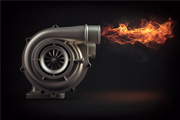Turbocharged Engines: Power Boost or Maintenance Nightmare? - Vol.498

You hit the gas, and there it is—that sudden surge of power, like your car just drank a shot of adrenaline. That’s the turbocharger at work, and it’s become the performance secret sauce in many of today’s cars. But is it all gain and no pain?
As with anything in the world of cars, turbocharging sparks debate. Fans praise the power and fuel efficiency. Critics warn of complexity and costly repairs. So, what’s the real story behind that little turbine under your hood?
Let’s break it down.
A turbocharger forces more air into the engine’s combustion chamber, allowing for more fuel to burn—and more power to be created. The result? A smaller engine that behaves like a bigger one, delivering impressive acceleration without the bulk or gas-guzzling of traditional performance engines.
Sounds like a win-win, right? It is—but with a few caveats.
Let’s address the elephant in the room: “Aren’t turbos unreliable?”
Not anymore. While early turbocharged engines had their share of issues, modern turbos are built to last. Automakers now use better materials, smarter cooling systems, and precision engineering to make sure these systems handle the heat—literally.
That said, turbo engines still need love. Regular oil changes with the right grade of oil are non-negotiable. Skimp on maintenance, and yes—you could face expensive problems. But treat your turbo right, and it will reward you with years of reliable performance.
What about fuel efficiency?
Contrary to popular belief, turbocharged engines aren’t just about speed—they’re about efficiency, too. A smaller turbo engine can sip fuel like a compact car when driven gently. It’s only when you push it hard (and feel that glorious boost) that the fuel consumption rises. So yes, it can be both powerful and economical—if you drive smart.
Heat, lag, and learning curve
Turbo engines do get hotter than naturally aspirated ones, so cooling is critical. Also, some drivers experience what's called “turbo lag”—a slight delay between hitting the pedal and feeling the boost. But today’s systems have minimized this, making the response feel almost instant in most models.
There’s also a learning curve. You’ll get the most out of a turbo when you understand how it behaves—when to ease off, when to push, and how to cool it down after a spirited drive.
Verdict?
Turbocharged engines offer a smart balance of power and efficiency, especially in cities like Lusaka or Cape Town where drivers want punchy performance without draining the tank. Yes, they need more attention than old-school engines—but the payoff is worth it.
So whether you're climbing hills, overtaking on the highway, or just want a bit more thrill in your daily drive, the turbo has your back—if you have its.
What’s your experience with turbos? Power boost or pain in the engine bay? Drop a comment—we want to hear your take.